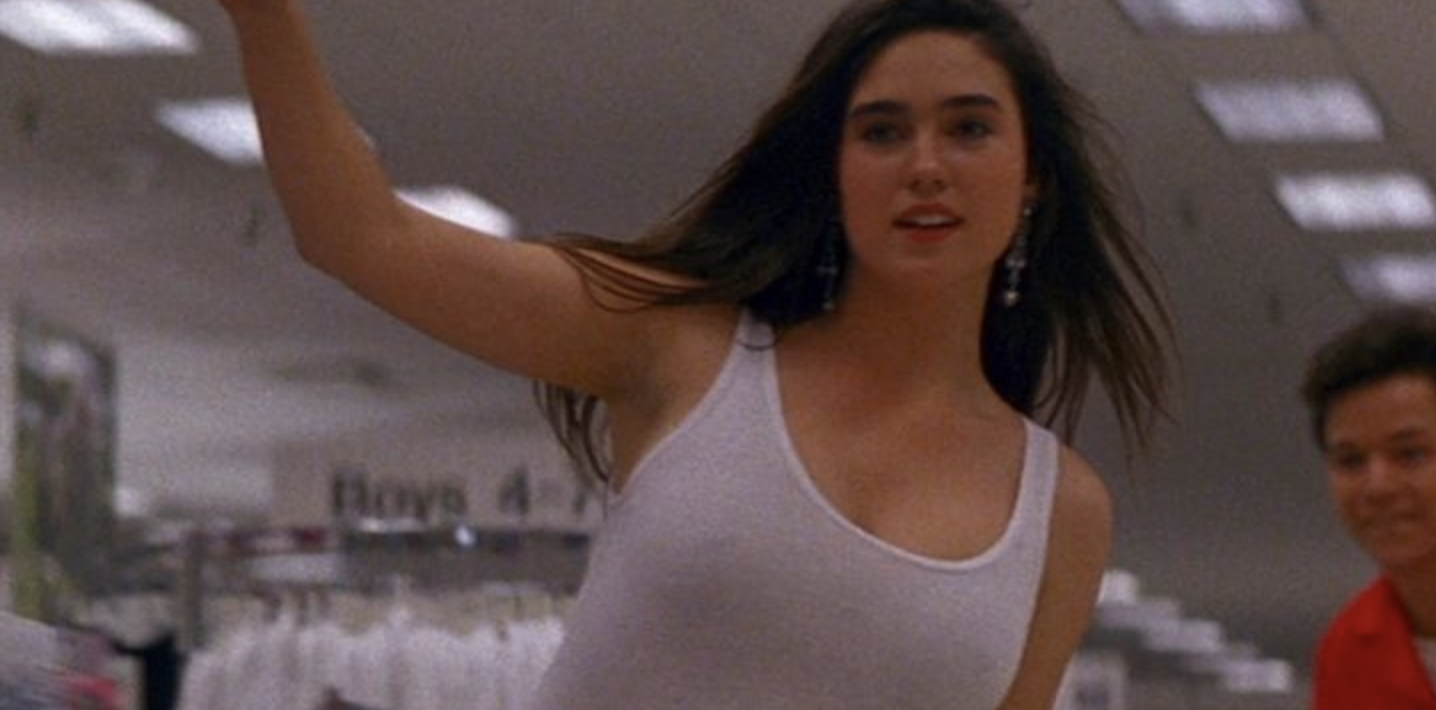What happens when Ferris Bueller gets trapped in Target… and Jennifer Connelly steals the whole movie?
Career Opportunities (1991) is like watching someone try to sell you a dream through a paper cup—thin, leaky, and not particularly satisfying. Written by John Hughes and directed by Bryan Gordon, the film had all the ingredients to be another quirky, heartfelt slice of Hughes’ signature teen-and-twentysomething storytelling. Instead, it feels like reheated leftovers of Hughes’ earlier brilliance. Somewhere in the background, you can almost imagine a drunk copywriter shrugging, whispering, “Good enough.”

The premise is deceptively promising: boy meets girl, they’re trapped in a Target overnight, hijinks ensue. That’s not the worst setup for a lighthearted romantic comedy. It even carries the kind of whimsical “what if” energy Hughes often thrived on. But instead of magic, what the audience gets is a dull hum of middle-of-the-road filmmaking, something so inoffensive it becomes almost forgettable.
At the center is Frank Whaley as Jim Dodge, a character clearly meant to be the audience’s charming everyman. He’s designed as a Ferris Bueller stand-in: irreverent, talkative, stuck in a small town but dreaming of more. Unfortunately, Whaley doesn’t have Matthew Broderick’s cheeky charisma or effortless timing. He plays Dodge like a man still figuring out how to act in front of a camera. He’s not awful, just bland, like a cardboard cutout placed in the fluorescent glow of a Target aisle. He moves, he speaks, but he rarely sparks. Watching him is like staring at a flickering neon sign—you notice the light, but it never warms you.

And then Jennifer Connelly walks in, and the film suddenly remembers it has a pulse. Connelly plays Josie McClellan, the rich girl rebelling against her privileged but suffocating life. Her arrival changes the atmosphere instantly. She’s absurd—absurdly beautiful, absurdly alive, with an energy that can’t be ignored. Connelly doesn’t just act; she commands. Every frame she enters, the movie shifts to orbit her. Frank Whaley practically vanishes whenever she’s on-screen, left blinking like he just realized he has to share the movie with someone who radiates actual star power.
The chemistry between the two leads is, frankly, lopsided. Connelly embodies gravity, charm, and a kind of youthful longing that feels authentic. Whaley, meanwhile, feels like he wandered in from a commercial audition. The imbalance makes the film frustrating, because there’s genuine potential in the setup: two young dreamers stuck in limbo, literally locked inside a consumerist palace overnight. With sharper direction or a stronger male lead,
Career Opportunities could have been quirky, romantic, and even profound in a Hughesian way. Instead, it limps along, leaning heavily on Connelly’s presence to distract from its mediocrity.

Plot-wise, the film is essentially Ferris Bueller transplanted into a big-box store. Jim Dodge, the small-town slacker, finds himself working a dead-end job as a night custodian. He dreams big, talks fast, but accomplishes little. Josie, the daughter of a wealthy local businessman, sneaks into the store to escape her controlling family. The two meet, flirt, and begin an impromptu adventure roaming aisles, trying on clothes, and testing the limits of their confined kingdom. Eventually, they cross paths with two bumbling crooks, Nestor and Gil, played by Dermot and Kieran Mulroney.
The criminals are so laughably incompetent that their scenes verge on parody. At times, you wonder if the movie itself is secretly rooting for them to succeed just to inject some excitement into an otherwise flat narrative. Their slapstick antics bring a little energy, but they feel shoehorned in, like someone decided the love story needed “stakes” and scribbled in a burglary subplot.

One of the few delights for cinephiles is spotting an uncredited John Candy as the Target manager. He breezes through in a cameo so brief it feels like a wink from Hughes, a reminder of better days when Hughes films carried heart and humor in equal measure. Candy’s presence is like spotting a rare bird in an otherwise drab aviary: delightful, but fleeting.
The biggest energy, of course, comes from Connelly. There are moments—her gliding through the store, her playful banter, even her silences—where she single-handedly transforms the film into something almost worthwhile. Without her, the movie would have been a forgettable cash-in on Hughes’ name. With her, it at least flickers with moments of allure, like a neon light trying to shine through fog.

Hughes himself admitted later that the film was a disappointment. That honesty feels refreshing, because it’s true: Career Opportunities is far from his best work. His trademark wit is muted, the characters underdeveloped, and the emotional beats half-hearted. Still, calling it a disaster would be unfair. The closed-store setting offers whimsical possibilities, and there’s a faint trace of Hughes’ small-town charm woven into the edges.
Why, then, has the movie developed a cult following? Partly nostalgia. For some, the idea of roaming a Target after hours with someone impossibly beautiful carries a simple wish-fulfillment fantasy. The locked-in setting provides a cozy playground for youthful rebellion and late-night discovery. And of course, there’s Connelly, whose performance elevates even the most pedestrian material. She turns what might have been a dull exercise into a fantasy flickering under fluorescent lights, reminding viewers that sometimes presence alone can create cinematic magic.

Ultimately, Career Opportunities is middle-of-the-road cinema, not memorable for its story or execution, but for the way Jennifer Connelly makes the screen shimmer. It’s proof that a single actor’s magnetism can carry an otherwise lackluster project. The movie is not great, and it knows it, but Connelly makes it tolerable, even enjoyable in bursts.
In the grand sweep of John Hughes’ career, this film is a footnote, a lesser work overshadowed by classics like The Breakfast Club and Ferris Bueller’s Day Off. Yet it still lingers in memory—not because of Hughes’ words or Gordon’s direction, but because of Connelly, luminous even under the buzz of bad fluorescent lights.
Watching Career Opportunities today feels like a reminder of the power of charisma. Sometimes one performer can change the entire temperature of a film. And while Whaley plays the “everyman” into bland anonymity, Connelly plays the muse, the dream, the spark. Without her, this movie would be lost. With her, it earns a strange sort of immortality, living on in late-night screenings, cult nostalgia, and the quiet fantasies of what might happen if you, too, were locked inside a Target overnight.





